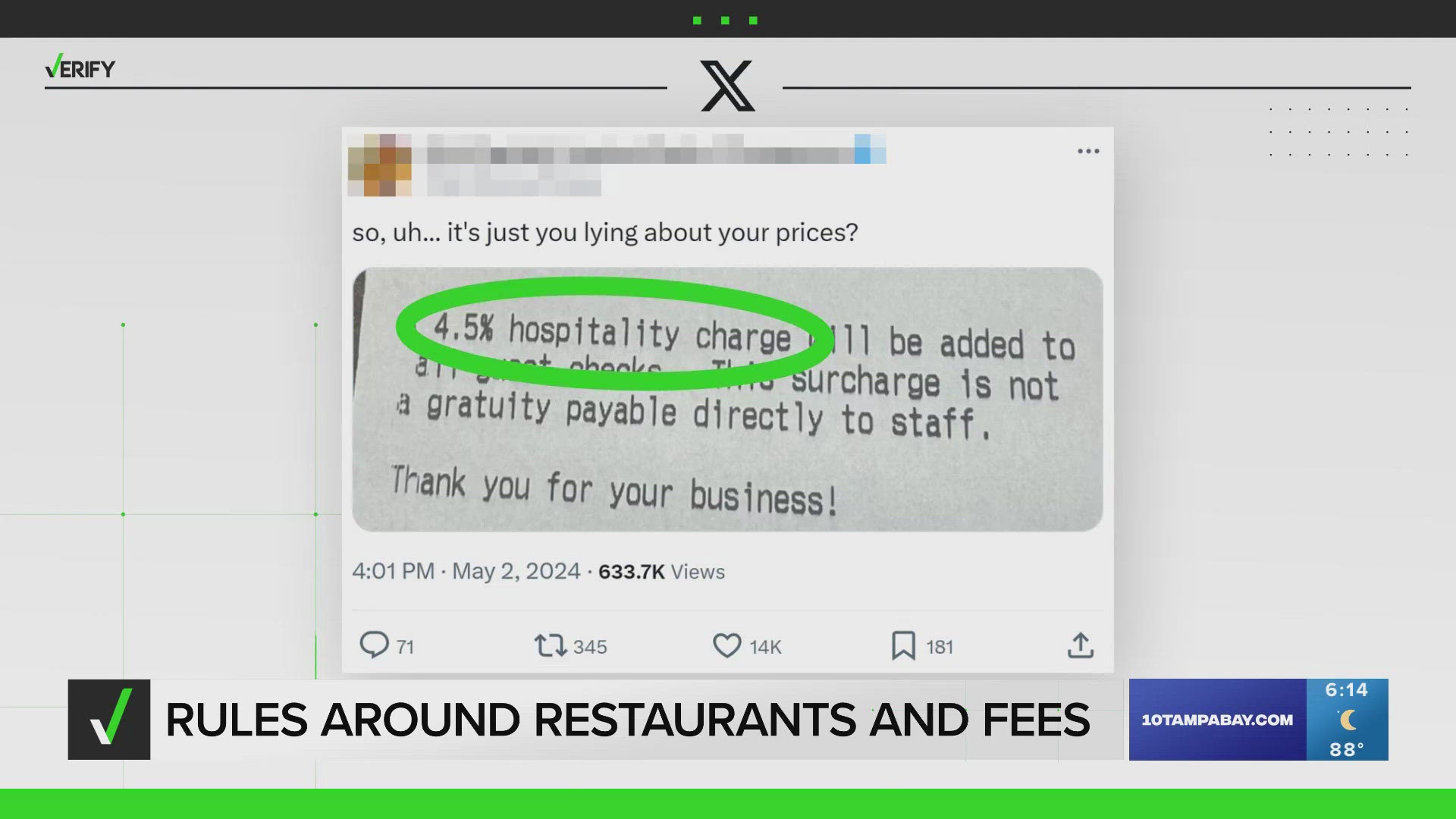ST. PETERSBURG, Fla. — The cost to eat out is going up as more restaurants are adding fees to your final tab.
It's a new type of sticker shock that has become familiar to diners in recent years.
Sometimes, restaurants will include a description of the fee on a menu or somewhere else on the premises. But other times customers may be surprised with a fee for the first time when they get the check at the end of their meal, and it may be unclear what the fee is for. These unexpected charges are often called “junk fees.”
Some people have suggested that surprise fees are illegal since the customer is being charged a price higher than what they were aware of when they ordered.
THE QUESTION
Are surprise restaurant surcharges illegal?
THE SOURCES
THE ANSWER
In Florida, service charges and other fees are permitted but they must be properly disclosed to the customer either on the menu or the bill.
WHAT WE FOUND
The Florida Restaurant and Lodging Association says restaurants must properly disclose any service charges or fees to customers.
Under Florida law, this disclosure rule also applies to automatic gratuities and must be displayed, "on the food menu and on the face of the bill provided to the customer."
States like California have banned fees altogether. A new law that’s set to take effect in July 2024 explicitly prohibits any business from charging nearly all extra fees, regardless of whether the customer is informed in advance.
The law says restaurants, for example, have to bake any surcharges into the actual listed prices on the menu, meaning they can’t tack on any fees even if they’re advertised ahead of time. The only exceptions are for taxes and shipping costs. Tips aren’t affected by the law as it only pertains to mandatory fees, not optional ones.
Other states are considering similar laws, but they have not yet been passed.
Currently, there’s no federal law prohibiting junk fees, regardless of whether a customer is informed in advance or not. Some states have banned these types of charges, but they remain legal in much of the country.
A group of senators proposed a bill in Congress that would require businesses to inform customers of any extra fees before they order and clearly explain what the fees are for. But that bill has not gained any momentum since it was first introduced last year and has yet to receive a committee hearing.
The Federal Trade Commission is considering issuing a new rule that could have similar effects to the proposed bill. Rules are essentially announcements by federal agencies of how they intend to enforce existing laws and can be changed by later administrations.
President Joe Biden has long advocated for such a regulation, but the FTC rule is still in its early stages and is unlikely to take effect anytime soon. The rule would apply to junk fees at restaurants as well as several other businesses, such as hotels and ticket vendors.
There’s also been momentum toward banning junk fees on the state and local levels.
Still, in most places, it remains unlikely that you would have a legal case against a restaurant that charged you a surprise fee.
The National Restaurant Association has opposed measures like the proposed FTC rule, saying restaurants already make significant efforts to avoid surprising customers with their surcharges, and that the restaurants need to charge certain fees to stay afloat.
“From delivery fees to service fees to credit card surcharges, restaurant operators make significant efforts to ensure these fees and surcharges are evident and identifiable before consumers receive the check,” the association said in a statement. “As costs for restaurants have continued to rise, consumers too are feeling inflationary pressures. This – and the reality that diners have extensive choices when eating out – means that consumers are sensitive to any menu price increases.”
VERIFY's Casey Decker contributed to this report.

